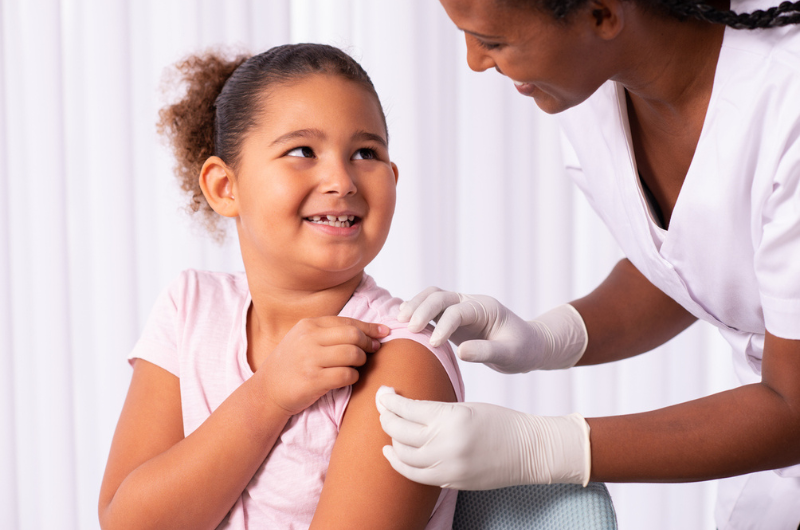The Truth Behind HPV Vaccine Myths

August 14, 2024
You've probably heard of the HPV vaccine. But how much of what you’ve heard is actually true?
The HPV vaccine protects against human papillomavirus (HPV), a common sexually transmitted infection. It's so common that most sexually active people will get it at some point in their lives. While this might sound alarming, it's important to remember that most HPV infections clear up on their own without causing any problems.
But in some cases, certain strains of HPV can cause serious health problems, including cervical, anal and throat cancers. Given as a series of shots over several months, the HPV vaccine helps to prevent those cancers.
It's been nearly 20 years since the HPV vaccine was approved by the U.S. Food and Drug Administration (FDA), but misinformation about the vaccine is high. False assumptions and incorrect info have led to confusion and vaccine hesitancy. To clear things up, we turned to Abraham Aragones, M.D., M.S., an associate member of the Hackensack Meridian Center for Discovery and Innovation.
6 Common HPV Vaccine Myths Debunked
Using insights from Dr. Aragones, let's dispel the most common myths about this life-saving vaccine:
Myth #1: The HPV vaccine only prevents cervical cancer.
While the HPV vaccine is highly effective in preventing cervical cancer, it also protects against other HPV-related diseases and cancers, including genital warts.
“Contrary to popular belief, the HPV vaccine protects against six different types of HPV-associated cancers, in men and women” Dr. Aragones emphasizes. Those cancers are:
- Anal cancer
- Cervical cancer
- Oropharyngeal cancer (throat cancer)
- Penile cancer
- Vaginal cancer
- Vulvar cancer
Myth #2: The HPV vaccine causes infertility.
Extensive research and clinical trials have shown no link between the HPV vaccine and infertility. According to the U.S. Centers for Disease Control (CDC), "There is no current evidence that HPV vaccines cause reproductive problems in women."
On the flip side, the vaccine can indirectly protect fertility by preventing cervical cancers and their treatments, which can sometimes impact fertility.
“HPV infection itself can cause changes in the cervix that can actually make you or give you some level of infertility,” notes Dr. Aragones.
Myth #3: The HPV vaccine is only for sexually active people.
According to Dr. Aragones, the best time to get the HPV vaccine is before becoming sexually active, ideally between the ages of 9-12. But it’s still beneficial for both men and women who are older than age 12 and who are already sexually active.
"Even if the vaccine is received later, it can still provide protection, but the optimal time is before sexual activity begins," says Dr. Aragones.
Myth #4: The HPV vaccine encourages sexual activity.
Some parents think that since HPV infection typically spreads through sexual activity, getting the vaccine is associated with sexual activity. The HPV vaccine does not promote or discourage sexual activity. Its purpose is to protect against a sexually transmitted infection that can lead to cancer — ideally before any infection has a chance to occur.
That’s why doctors recommend that prepubescent children (ages 9-12) get the vaccine.
Myth #5: Only girls need the HPV vaccine.
Both boys and girls should get the HPV vaccine. While cervical cancer affects women, men can develop other HPV-related cancers, such as anal and throat cancer.
Myth #6: The HPV vaccine is unnecessary or unimportant.
The HPV vaccine is a safe and effective way to prevent cancer. Evidence proves that delaying or avoiding the vaccine increases risk of developing HPV-related diseases.
"Vaccines are great, and they have saved so many lives," says Dr. Aragones. "The HPV vaccine is another tool that we have in our toolbox to protect against an infection, in this case, HPV, and then also against cancer."
The current vaccine protects against nine of the highest-risk HPV strains. Among those nine are the stains responsible for most cervical pre-cancers and cancers, as well as strains that cause exterior lesions and genital warts.
The ability to prevent cancer is important and necessary. And the effectiveness of the HPV vaccine is proof. Research shows that if HPV vaccination is received before exposure to the virus, it's 97% effective in preventing cervical cancer and cell changes that could turn into cancer.
"The HPV vaccine is one of the most effective tools we have to prevent cancer," affirms Dr. Aragones.
If you have the ability to protect your children from certain types of cancer, what's stopping you?
Next Steps & Resources
- Meet our expert: Abraham Aragones, M.D., M.S.
- Make an appointment online with a doctor near you, or call 800-822-8905.
- Learn more about our primary care services.
The material provided through Healthier You is intended to be used as general information only and should not replace the advice of your physician. Always consult your physician for individual care.






